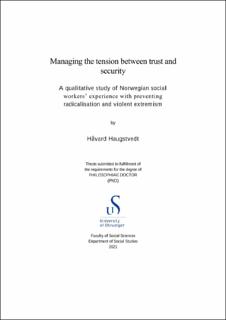| dc.contributor.advisor | Tuastad, Svein Erik | |
| dc.contributor.advisor | Gunnarsdottir, Hulda Mjøll | |
| dc.contributor.author | Haugstvedt, Håvard | |
| dc.date.accessioned | 2021-10-05T11:58:18Z | |
| dc.date.available | 2021-10-05T11:58:18Z | |
| dc.date.issued | 2021-09 | |
| dc.identifier.citation | Managing the tension between trust and security: A qualitative study of Norwegian social workers’ experience with preventing radicalisation and violent extremism by Håvard Haugstvedt, Stavanger : University of Stavanger, 2021 (PhD thesis UiS, no. 604) | en_US |
| dc.identifier.isbn | 978-82-8439-026-0 | |
| dc.identifier.issn | 1890-1387 | |
| dc.identifier.uri | https://hdl.handle.net/11250/2787719 | |
| dc.description.abstract | In Norway, social workers play a formalised part in the national strategy to prevent radicalisation and violent extremism. This part is played out by engaging with other services and organisations, such as the schools, health services, police and the police security service (PST), in a multiagency cooperation. In addition, social workers engage directly with individuals who have been deemed at risk of further radicalisation and are tasked with providing prevention and follow-up services. Norwegian social workers’ experiences from the work to prevent radicalisation and violent extremism (PVE) have not yet been specifically explored. Thus, this study asks the following main research question: How do Norwegian social workers experience and reflect upon their engagement in preventive work against radicalization and violent extremism?
To answer this, an explorative qualitative study was devised utilizing data from 17 in-depth interviews and two focus-group interviews, analysed through an eclectic theoretical framework to reveal new knowledge. Furthermore, the study seeks to contribute to a theoretical development of social work in a new knowledge and practice field, alongside police and PST. The study finds that Norwegian social workers performing PVE experience tension from conflict expectations. First, Norwegian social workers frame and approach the task of PVE as a social issue and lean on common social worker strategies, and trustbuilding, in particular. This is labelled internal expectations. Next, through cooperation with police and PST, they are expected to participate in a more ‘secretive’ practices, where sensitive information flows more smoothly, without clients’ necessarily being aware of this. Analysis of this cooperation indicates that several types of jurisdictional settlements between social workers and the police, and PST in particular, exits. Of these, subordination to PST raise the most apparent ethical dilemmas for social workers. This practice influence and expectations from policy documents are labelled as external expectations. The conflict occurring between these two expectations create tension in the form of emotional dissonance and person role/conflicts. To cope with these, social workers apply emotion management strategies (internal management) as well as social support from peers and support staff (external management). As an extension of social support, where social workers may become aware of how policy and other professional logics influence their practice field, this thesis suggests that social workers may communicate these challenges to managers and policymakers through an offensive policy directed practice. These findings contribute to the development of the role of the social worker itself, influenced by security logics and policy, and suggests how this can be dealt with through a clearer demarcation between what is and what is not included in the tasks and responsibilities of social workers in PVE. | en_US |
| dc.language.iso | eng | en_US |
| dc.publisher | University of Stavanger, Norway | en_US |
| dc.relation.ispartofseries | PhD thesis UiS; | |
| dc.relation.ispartofseries | ;604 | |
| dc.relation.haspart | Paper 1: Haugstvedt, H & Tuastad, S., E. (Minor revisions will be submitted in July 2021). “It gets a bit messy”: Norwegian social workers’ perspectives on collaboration with police and security service on cases of radicalisation and violent extremism. Under review in Terrorism and Political Violence | en_US |
| dc.relation.haspart | Paper 2: Haugstvedt, H. (2019). Trusting the Mistrusted: Norwegian Social Workers’ Strategies in Preventing Radicalization and Violent Extremism. Journal for Deradicalization, 19, 149–184. | en_US |
| dc.relation.haspart | Paper 3: Haugstvedt, H. & Gunnarsdottir, H., M. (Submitted 2021). Managing Role Expectations and Emotions in Encounters with Extreme Ideology: Norwegian Social Workers’ Experiences. Under review in Qualitative Social Work | en_US |
| dc.relation.haspart | Paper 4: Haugstvedt, H. (2020). The role of social support for social workers engaged in preventing radicalization and violent extremism. Nordic Social Work Research, 1–14. https://doi.org/10.1080/2156857X.2020.1806102 | en_US |
| dc.rights | Copyright the author | |
| dc.subject | terror | en_US |
| dc.subject | terrorisme | en_US |
| dc.subject | radikalisering | en_US |
| dc.subject | sosialarbeidere | en_US |
| dc.subject | PST | en_US |
| dc.subject | politiets sikkerhetstjeneste | en_US |
| dc.title | Managing the tension between trust and security: A qualitative study of Norwegian social workers’ experience with preventing radicalisation and violent extremism | en_US |
| dc.type | Doctoral thesis | en_US |
| dc.rights.holder | ©2021 Håvard Haugstvedt | en_US |
| dc.subject.nsi | VDP::Samfunnsvitenskap: 200::Sosialt arbeid: 360 | en_US |
